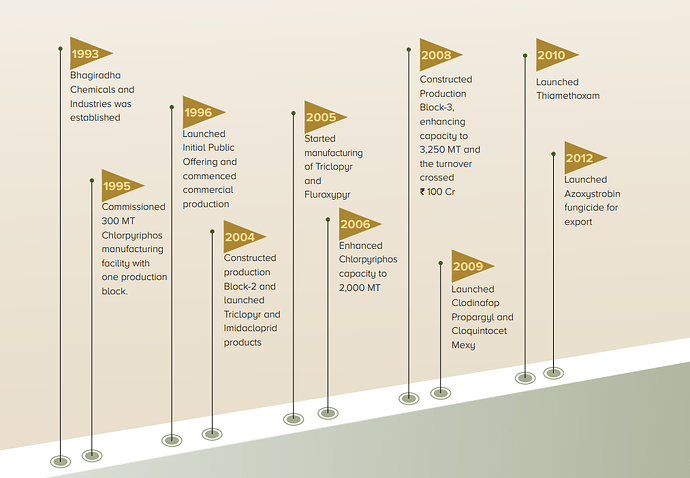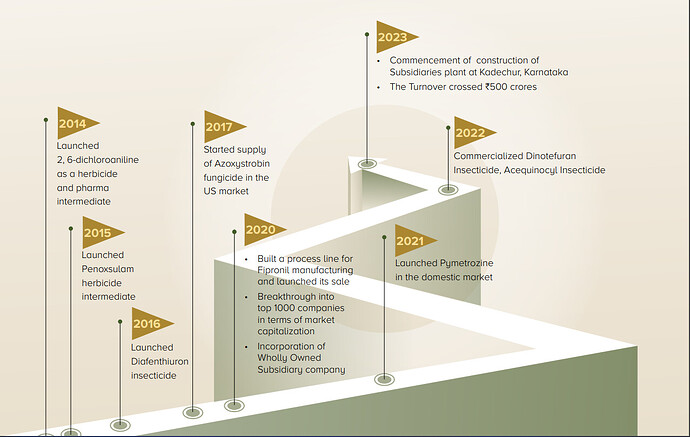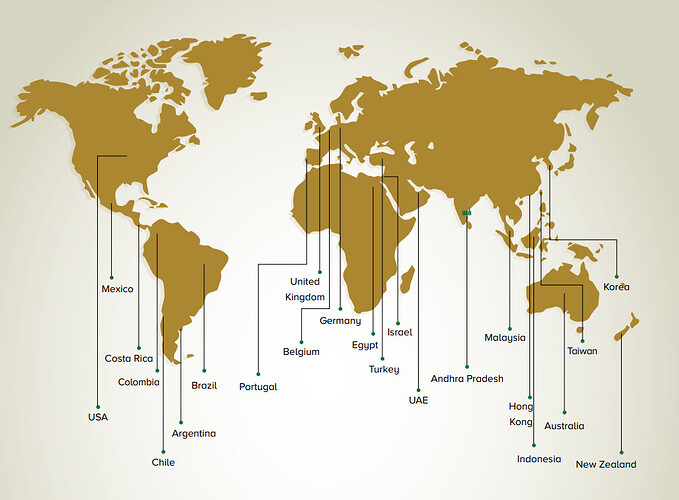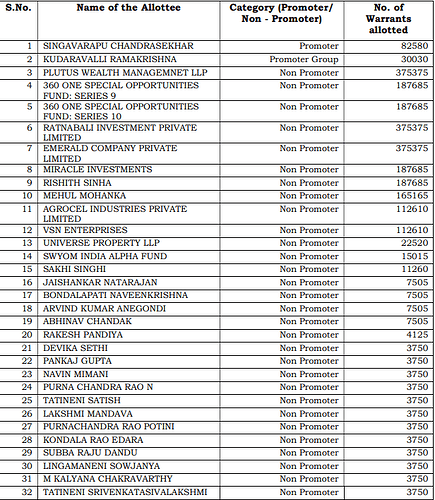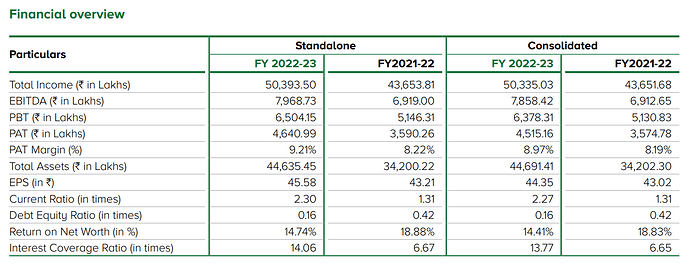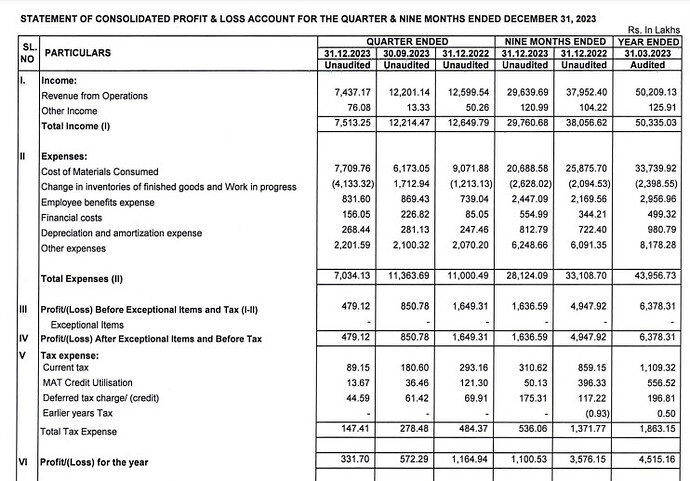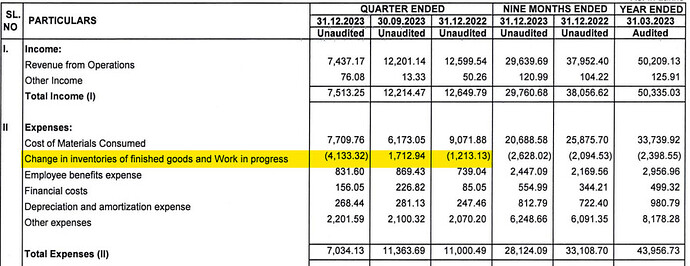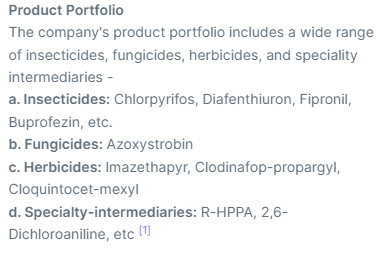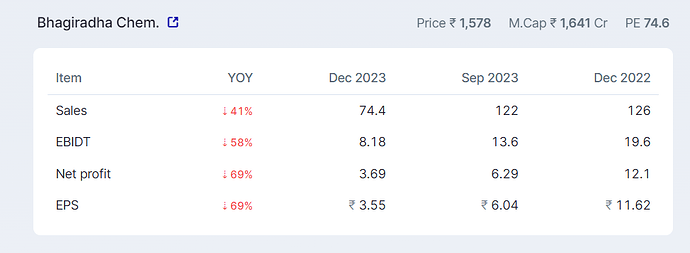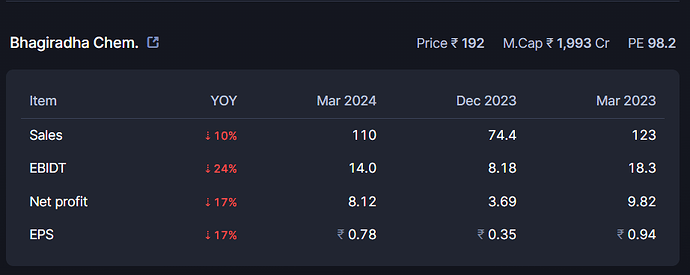ABOUT
Bhagiradha Chemicals & Industries is an Agro Chemical Company in India involved in the manufacturing of insecticides, fungicides, herbicides, etc. It was Promoted by the late Sri S. Koteswara Rao, a former scientist of the Indian Institute of Chemical Technology, Hyderabad in the year 1993.
KEY POINTS
Product Portfolio
The company’s product portfolio includes a wide range of insecticides, fungicides, herbicides, and specialty intermediaries -
a. Insecticides: Chlorpyrifos, Diafenthiuron, Fipronil, Buprofezin, etc.
b. Fungicides: Azoxystrobin
c. Herbicides: Imazethapyr, Clodinafop-propargyl, Cloquintocet-mexyl
d. Specialty-intermediaries: R-HPPA, 2,6-Dichloroaniline, etc
Product Concentration
The co. has over twenty products and expertise in other processes, the revenue streams of the co. however, are concentrated on four products which together contributed 84% of the gross sales for the co. in FY22.
Export Presence
The co. exports its products to various countries viz. USA, Brazil, Columbia, Argentina, Mexico, Costa Rica, Germany, UK, France, Portugal, Italy, Israel, Turkey, Iran, Indonesia, Taiwan, Malaysia, New Zealand, and Australia. In FY23, exports accounted for ~11% of overall revenues v/s 24% in FY22.
R&D Capabilities
The co. has an established R&D division located at the factory premises, which the Ministry of Science & Technology (GOI) also recognizes. BCIL spends about Rs 1.50 crore for R&D every year (Rs. ~4 cr in FY23). It has successfully commercialized three insecticides, namely, Fipronil, Pymetrozine, and Dinotefuran. During FY23, two Indian patents have been granted to the co.
Manufacturing Capabilities
The co. is operating its manufacturing facility in Cheruvukommupalem, Ongole, Andhra Pradesh. More than 60% of the 71.68 acres of factory land is an open area covered with a green belt and its three production blocks cater to five process lines, utilities, a quality assurance block, a warehouse, an R&D facility, etc. It has a capacity of 3250 MTPA of chemicals.
Capacity Utilization
During FY22, the co. achieved a capacity utilization (CU) of ~80% compared to ~70% in FY21.
New Facility
The co. had signed an MOU with the Government of Karnataka for setting up a manufacturing unit in Kadechur industrial area, Yadgir Dist., Karnataka, through its WOS- Bheema Fine Chemicals. The project is expected to be completed in three phases at an estimated cost of Rs 350 crore. This new unit will roll out commercial production by FY25.
Strategy
The co. is aiming to have registration approvals in place during FY24 for a couple of products that have commercial potential and also focusing on improving its overseas footprint with new strategies.
In a recent company do allotment of 25,61,425 Convertible warrants for the company’s expansion
-
In this allotment MEHUL MOHANKA who is MD of TEGA INDUSTRIES also invested.
-
In this expansion company says that they will achieve 1200 cr revenue in three years(the recent highest revenue was 500 cr in FY23)
Financial FY23
- Market capitalisation : 1246.58 cr
- Net worth : 314.81 cr
- Total revenues : 503.94 cr
- Growth in Revenues : 15.44%
- EBITDA : 79.69 cr
- EBITDA Margin : 15.81%
- Growth in EBITDA : 15.94%
- PAT : 46.41 cr
- Debt-equity ratio : 0.16
- Number of employees on rolls : 467
- Production capacity : 3,250 MT
Key strengths
Experienced promoter group with established presence in the Agrochemicals Industry:
- BCIL was promoted by Late Mr. Singavarapu Koteswara Rao and Mr. Dodda Sadasividu in 1993. The company is currently managed by Mr. S. Chandrasekhar (son of the Late Mr. Koteswar Rao), who is the Managing Director of the company. Mr. Chandrasekhar completed his B. Tech in Chemical Engineering from Osmania University and M.S. in Chemical Engineering from the University of Illinois, Chicago, USA. He joined BCIL in the year 2001 and worked as R&D Manager. The company has a strong team of other key managerial personnel who are highly qualified and possess abundant experience in their respective domains.
Strong in-house Research and Development:
- BCIL has an established and continuously upgraded R&D division located at the factory premises, which is recognized by the Ministry of Science & Technology, Government of India. Given the huge
competition from the domestic and large MNCs, R&D activity plays an important role for the players participating in the pesticide industry. On average BCIL spent about Rs 1.50 crore for R&D for the past three years. At BCIL, the R&D teams have successfully worked and implemented various process upgrading methods through backward integration of production processes, developed viable processes for several production processes, and developed new chemicals. The company tries to optimize its existing technologies and scale up operations aided by the seamless efforts of the R&D team, which has resulted in the development of several new products and enabled the company to hold process patents for one of their major products Azoxystrobin. During the past three years, BCIL commercialized three insecticides, namely, Fipronil, Pymetrozine, and Dinotefuran.Established product line:
- Pesticides are broadly classified into insecticides, herbicides, fungicides, rodenticides, etc. depending on the type of pest they control. BCIL manufactures insecticides, herbicides, and fungicides (majorly technical with a very small portion of formulations) and has a product portfolio of over 13 products with 10 more products under development. The major products of BCIL include Chlorpyrifos, Chlorpyrifos Methyl, Triclopyr, Azoxystrobin, and Fipronil.
Improved financial performance and healthy profitability margins in FY23:
- In FY23, the total income of the company improved by about 15% led by the constant demand for products supplied by BCIL and the contracts BCIL had with its customers which enabled them to maintain profitability despite the increase in input prices in the second half of FY23. Profitability in FY23 improved marginally and remained healthy with the operating margin at 15.67% (FY22: 14.79%). Interest and depreciation expenses were like that of FY22 which resulted in an improvement in PAT margin by 88 bps to 8.21%.
Healthy capital structure and debt coverage indicators:
- As of March 31, 2023, the debt profile of BCIL consists of term loans availed for setting up new product lines, GECL loans, and working capital borrowings. Capital structure marked by overall gearing remained comfortable at 0.43x as of March 31, 2023 (PYE: 0.40x) on account of equity infusion in the form of rights issue for amount Rs. 83 crores and accredited healthy accruals of the company in FY23 leading to improved net worth. The net worth of the company improved to Rs. 312.29 crores as of March 31, 2023, against Rs. 189.64 crores as of March 31, 2022. Other debt coverage indicators also are satisfactory with the Interest coverage ratio and TDGCA of the company improving and remaining healthy at 15.49x (PY: 7.51x) and 0.80x (PY: 1.58x) respectively.
Key weaknesses
Subdued financial performance in H1FY24:
- In H1FY24, Total operating income (TOI) declined by about 12.32% to Rs.222.93 crore (H1FY23: Rs.254.25 crore). The company’s revenue was adversely impacted due to an increase in input prices coupled with the slowdown in demand from the global market and domestic market sustained for almost major part of H1FY24 which resulted in lower sales realizations. Further, the PBILDT and PAT margins of the company significantly declined by 568 bps and 518 bps i.e., 9.72% and 3.81% respectively.
Proposed ban On Chlorpyriphos:
- In May 2020, the Government of India announced that it had decided to impose a ban on 27
widely used pesticides out of which one product named Chlorpyriphos is manufactured and sold by BCIL which contributes a significant share to overall revenue. However, the ban is yet to be imposed and BCIL continues to sell the product and derive benefits from the same. Further, BCIL also introduced other products into the market which have seen wide acceptance as a result of which the risk is partially mitigated. However, given the contribution of Chlorpyriphos to overall revenue, the impact is likely to be seen if the proposed ban is imposed. As per Insecticides (Prohibition) order 2023, Chlorpyriphos was classified under restricted use (i.e., omitting crops of Ber, Citrus, and Tobacco from approved usage) Vide S.O. 701(E), dated 15.02.2023.Volatility in the raw material prices and foreign exchange risk:
- Raw material cost is the major cost element for the company with the contribution of ~74% to the cost of sales in FY23 (compared to ~64% in FY22). The major raw materials consist of several chemical compounds predominantly Tri Chloro Acetyl Chloride (TCAC), Di Ethyl Thiophosphoryl Chloride (DETC), Tri Methyl Ortho Formate, O Chloro Benzyl Cyanmide, Pyrrolidine, Sodium Salt, etc. The prices of the major inputs (chemical compounds) are volatile which may impact the profitability of the company given the limited pricing flexibility given the huge competition in the industry, particularly cheap exports from China. However, the company has successfully finished its backward integration capex of azoxystrobin which reduces the volatility to some extent.
High dependency on monsoon/ climatic conditions and crop cycle for revenue:
- In India cropping season is mainly classified into Kharif (July to October) and Rabi (October to March). The Kharif crops include rice, maize, sorghum, pearl millet/bajra, finger millet/ragi (cereals), arhar (pulses), soybean, groundnut (oilseeds), cotton, etc. The Rabi crops include wheat, barley, oats (cereals), chickpea/gram (pulses), linseed, and mustard (oilseeds). BCIL derives its sales from the agriculture sector, which is highly dependent upon monsoons as well as the incidence of fungal/pest attacks on crops. Further, given the demand dependent on monsoon, the industry (in India) is characterized by seasonality. To address the seasonality issue, however, the company has diversified and increased its sales into the export markets and export sales contributed 10% of TOI during FY23.
High exposure to government regulations:
- BCIL has high exposure to government regulations both by the Indian government and the customer country. The government of India vide draft gazette notification dated May 18, 2020, has placed 27
insecticides/ pesticides into a banned category, post 45 days from the date of publication of notification. The notification is however a draft version and is subjected to revision in the final order. BCIL’s product portfolio consists of two pesticides i.e., chlorpyriphos and sulfosulfron which are a part of the banned pesticides as per the draft gazette. Furthermore, chlorpyriphos alone contributed a significant share of BCIL’s revenue. Further, BCIL has already developed two substitute products to the banned product which are under trial runs and can be replaced/launched depending on need basis.Ongoing debt-funded capex at the subsidiary level:
- BCIL had signed an MOU with the Government of Karnataka for setting up
a manufacturing unit in the Kadechur industrial area, Yadgir Dist., Karnataka, through its wholly owned subsidiary- “Bheema Fine Chemicals Pvt Ltd” (Bheema). The project is envisaged to be completed in three phases at an estimated project cost of Rs 350 crore. The first phase of the project was initially expected to be completed by December 2022 with a cost of Rs. 120 crores. However, due to delays in approvals, there is an escalation in project cost by Rs.30 crore i.e., the project cost now envisaged is Rs.150 crore and the same is expected to be met through internal accruals of about Rs.105 crore, and the balance through term debt. BCIL shall be extending corporate guarantees towards the debt proposed to be availed by Bheema in FY24 for phase I. The project is expected to is scheduled to commence operations from Q4FY24 onwards.Elongated operating cycle:
The company procures the raw materials majorly from the indigenous market at 70%-75% of total purchases and imports raw materials from China which contributes around 20%-25% of total purchases. Payment terms with suppliers range from 60 to 90 days. BCIL provides a credit period of 90 to 120 days to its customers and holds inventory for 90 days. The operating cycle of the company elongated to 97 days in FY23 (PY: 70 days) on account of an increase in the average collection period to 81 days (PY: 65 days). On an absolute level, total receivables increased to Rs. 128.77 crores (PYE: 96.59 crores) which is majorly on account of debtors pending realization towards the sales reported in the last quarter of FY23.
However, in H1FY24, owing to a subdued performance in the agrochemicals sector, the company experienced an extension in its operating cycle to 125 days due to by delay in receivables, leading to an extended collection period of 101 days.
Liquidity Adequate:
- The liquidity position of the company is adequate marked by accruals of Rs. 62.49 crore as of March 31, 2023, with a repayment obligation of Rs. 4.55 crore. Liquidity is supported by positive cash flows from operations and above unity current ratio of 2.26x as of March 31, 2023. Internal accruals of the company are sufficient to meet the repayment of the term loan projected in FY24 with accredited profits. Further, Unutilised working capital limits and a partial amount received from convertible share warrants of Rs. 85.30 crores provide sufficient cushion to meet working capital requirements and capex needs.
Environment, social, and governance (ESG) risks:
Environment
- BCIL conducts its manufacturing operations in an environmentally responsible manner. About 60% of BCIL’s plant area is covered under a green belt. The company continues to upgrade its infrastructure to reduce emissions and has installed an Online Continuous Emission Monitoring System to record real-time data and is following the ‘Miyawaki Plantation’ Methodology as per the directions of the Pollution Control Board.
Social:
- The Company’s social commitments span in the areas of education, health, and community development. BCIL initiates different types of training and development programs to foster skill development and create a future-ready workforce.
Governance:
- BCIL regularly reviews Company policies, creates an environment that encourages ethical behavior, and promptly informs staff on important policy changes.
DISC: Invested in stock. Views are biased

